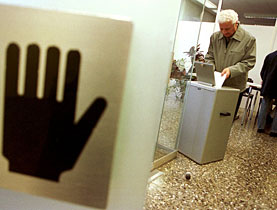Citizenship vote outcome stirs mixed emotions

The failure of the rightwing Swiss People's Party to reinstate the ballot box for citizenship applications in Switzerland has been met by relief.
Commentators have pointed to a lack of a clear message as one reason behind Sunday’s “no” vote. Party internal squabbles may also have played a role – a charge which the leadership denies.
With 63.6 per cent saying no, Swiss voters clearly rejected the People’s Party initiative that also aimed to stop the right of appeal over naturalisations. The proposal also failed to reach a majority among the 26 cantons, with only Schwyz voting in favour.
The result was welcomed by the government, which had opposed the move. President Pascal Couchepin said it was proof that the population had confidence in the authorities.
“Direct democracy implies the respect of the rule of law, which is not compatible with discrimination and arbitrary decisions,” said Couchepin.
Five years ago the Federal Court outlawed the ballot box for citizenship requests. This followed a series of allegedly discriminatory decisions, particularly against people of Balkan origin.
Switzerland has around 21 per cent foreign residents and has one of the toughest citizenship processes in Europe.
The People’s Party argued that it was up to local communities to decide on their naturalisation procedures – whether public assembly, special panel or secret vote at the ballot box.
Campaign criticism
The party said it was not entirely surprised by the outcome of the vote. “We had a wide front against us,” said Adrian Amstutz, one of the party’s vice-presidents.
Party officials rejected criticism of their campaign, saying they would continue their fight for tougher naturalisation measures.
The party’s campaign posters were not without controversy – one showed hands grabbing a Swiss passport and adverts purported to show criminal foreigners.
Opponents of the initiative, including four of the five main political parties, said they were relieved by the outcome. The result shows that there was not “much meat on the bones” of the proposal, they added.
Green Party president Ueli Leuenberger said that it also demonstrated that million-franc campaigns did not necessarily bear fruit.
For Georg Lutz, a political analyst from Lausanne University, voter confusion during the campaign was as a key reason why the ballot failed.
“It was a very populist campaign, it was very much focused on criminal foreigners, on local democracy, but what the initiative actually would have changed was not particularly clear,” he told swissinfo.
Internal squabbles
Analyst Claude Longchamp told public television that internal squabbles over justice minister and People’s Party member Eveline Widmer-Schlumpf and her home Graubünden regional party had played a role as well.
Widmer-Schlumpf is facing expulsion after she replaced the party’s controversial figurehead Christoph Blocher in government last December, against the leadership’s wishes.
Lutz agrees that the row had an indirect effect. “The party and its leadership had to explain much more often what was going on inside the party, rather than what the important issues were and why people should vote for them,” he said.
However, People’s Party president Toni Brunner has played down the influence of these events.
The party still remains the strongest in Switzerland. Lutz said that the defeat in the citizenship vote did not mean that it was facing a turning point.
The leadership was aware that party internal change could take time, he said, and that they could risk losing votes or cantonal elections in the process.
“Their calculation is that in the long-term the change makes the party stronger,” said Lutz.
swissinfo, Isobel Leybold-Johnson
Citizenship: 36.2% yes; 63.8% no
Health reform: 30.5% yes; 69.5% no
Government information: 24.8% yes; 75.2% no
Turnout: 44.1%
The People’s Party also suffered defeat over the two other issues that came to a nationwide vote on Sunday.
The electorate rejected a proposed reform of the health system aimed at strengthening the role of the insurance sector and curbing health expenditure.
It also opposed a plan to limit the federal authorities’ information policy ahead of nationwide ballots.

In compliance with the JTI standards
More: SWI swissinfo.ch certified by the Journalism Trust Initiative




You can find an overview of ongoing debates with our journalists here. Please join us!
If you want to start a conversation about a topic raised in this article or want to report factual errors, email us at english@swissinfo.ch.